Women’s History Month celebrates with ‘Served like a Girl’ at BC
March 15, 2019
Bakersfield College held ‘Served Like a Girl’ on March 11.
It was hosted at the campuses Levan Center by BC’s Women’s History and More Committee where the Lysa Heslov’s directed film was screened.
The film ‘Served Like a Girl,’ was a film that explored the lives of several women who were military veterans. The film also showed the veterans’ struggling with life’s highs and lows and the unfortunate and disproportionate reality of homelessness for female veterans turned civilians.
The documentary followed several women as they joined the “Ms. Veteran America” competition created by veteran Jaspen Boothe.
The Ms. Veteran American will be held in Hollywood, L.A. on Oct. 13.
Furthermore, the competition was initiated in 2012 and more than 456,000 dollars have been raised for veterans and their family.
Contestants must consist or being a veteran, have an Honorable discharge from the military, and have good health. Also, they must be actively involved in the local community as a volunteer.
BC professor of English for Multilingual Students, Elizabeth Rodacker, gave a brief introduction to the film.
During the showing of the film, viewers were introduced diverse women from different walks of life who all had two things in common, they were all women, and they were all veterans.
One of the main characters of the film, Army Captain Jaspen Boothe, started the Ms. Veteran American competition because of her personal experience with homelessness after being let go by the military due to being diagnosed with cancer.
“You’re not here for yourself; you’re not here for me either. You’re here for those women and that child who’s sleeping in their car,” she said.
“I was once one of those women you’ll be representing.”
One of the things that the documentary made clear was that women veterans struggled with issues of PTSD, physical injury, and sexual abuse at the hands of the military, and also had difficulties finding help for such problems outside of the military as veterans because of their gender.
As the documentary came to an end, Professor Rodacker ended the event by having a Q and A with the audience members about the film.





